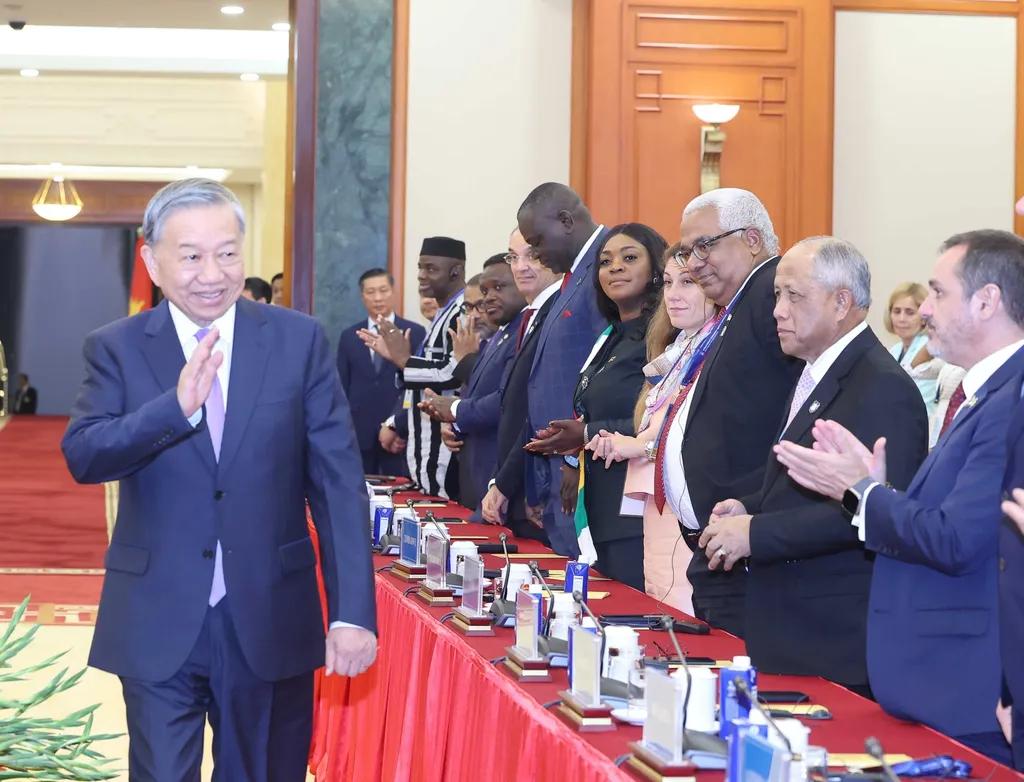 Politics & Law
Politics & Law

 |
| Party General Secretary Tô Lâm receives heads of delegations to the Signing Ceremony of the UN Convention against Cybercrime in Hà Nội on Saturday. — VNA/VNS Photos |
HÀ NỘI — The signing ceremony of the United Nations Convention against Cybercrime (also known as the Hanoi Convention) will mark a new chapter in global cyber cooperation and governance, making cyberspace a domain of law, collaboration, and development, Party General Secretary Tô Lâm affirmed on Saturday.
Hosting a meeting with heads of the delegations attending the Hanoi Convention signing ceremony and high-level conference, General Secretary Lâm emphasised that the participation of representatives from various countries and international organisations in this global event was a vivid testament to the spirit of international solidarity in addressing a common challenge of humanity. It also reaffirmed the strong bonds of friendship and cooperation between Việt Nam and nations around the world.
The General Secretary expressed his pride that Hà Nội was unanimously chosen by UN member states for the convention’s signing, recognising Việt Nam’s contributions to combating cybercrime. He noted this also reflected the international community’s appreciation of the country’s efforts to promote peace and security, and its rising global standing.
 |
| Party General Secretary Tô Lâm takes a group photo with heads of delegations to the Signing Ceremony of the UN Convention against Cybercrime. |
The Vietnamese Party chief assessed that the world was undergoing profound and rapid changes, with strategic competition among major powers, arms and nuclear races, regional conflicts, and ethnic and religious tensions remaining complex. Non-traditional security challenges and the downsides of the technology revolution had further heightened global uncertainty and risk.
In this context, he stressed a deeper appreciation for the value of peace, stability, and the defence of national independence, sovereignty, and territorial integrity based on the principles of international law and the UN Charter.
General Secretary Lâm affirmed that, as an integral part of the international community, Việt Nam was proactively harnessing the potential of cyberspace and cyber-related technologies for development.
In the time ahead, Việt Nam would stay steadfast on its socialist path, promoting self-reliance, confidence, and national pride while expanding partnerships worldwide for shared global goals, he said, adding that it looked forward to continued support and cooperation from political parties, friends, and peace-loving peoples to strengthen international solidarity and contribute to global peace, development, and human progress.
Calling on all countries to ratify the convention soon so it could take effect promptly, the top leader affirmed that Việt Nam reaffirmed its commitment to working with other nations and international organisations to promote cooperation in harnessing the potential of cyberspace and combating cybercrime, for peace, stability, and sustainable development of all nations, and for a safe, happy life for people around the world.
Ghada Waly, Executive Director of the UN Office on Drugs and Crime (UNODC), commended Việt Nam’s pioneering role and active contributions throughout the negotiation process and in hosting the convention’s signing ceremony in Hà Nội. She emphasised that the convention marked a major step toward establishing the first global legal framework to enhance international cooperation in combating cybercrime. UNODC reaffirmed its commitment to supporting Việt Nam through technical assistance, capacity-building, and exploring the possibility of establishing a Regional Cybercrime Training Centre in Hà Nội.
 |
| General Secretary Tô Lâm greeted the heads of participating delegations to the signing of the UN Convention against Cybercrime in Hà Nội. — VNA/VNS Photo |
Speaking on behalf of the heads of delegations, Maria Jose Pinto Gonzalez Artigas, Vice President of Ecuador, noted that the convention was built on cooperation and understanding. By signing it, countries committed to sharing expertise and working together to address cyber threats. She stressed that the signatures marked not the end, but the beginning of a long journey – one that would require capacity-building, stronger institutions, youth education, and the engagement of the private sector and civil society. "Cybersecurity is not solely the responsibility of governments but of everyone, and unity is the strongest shield," she affirmed. — VNA/VNS




